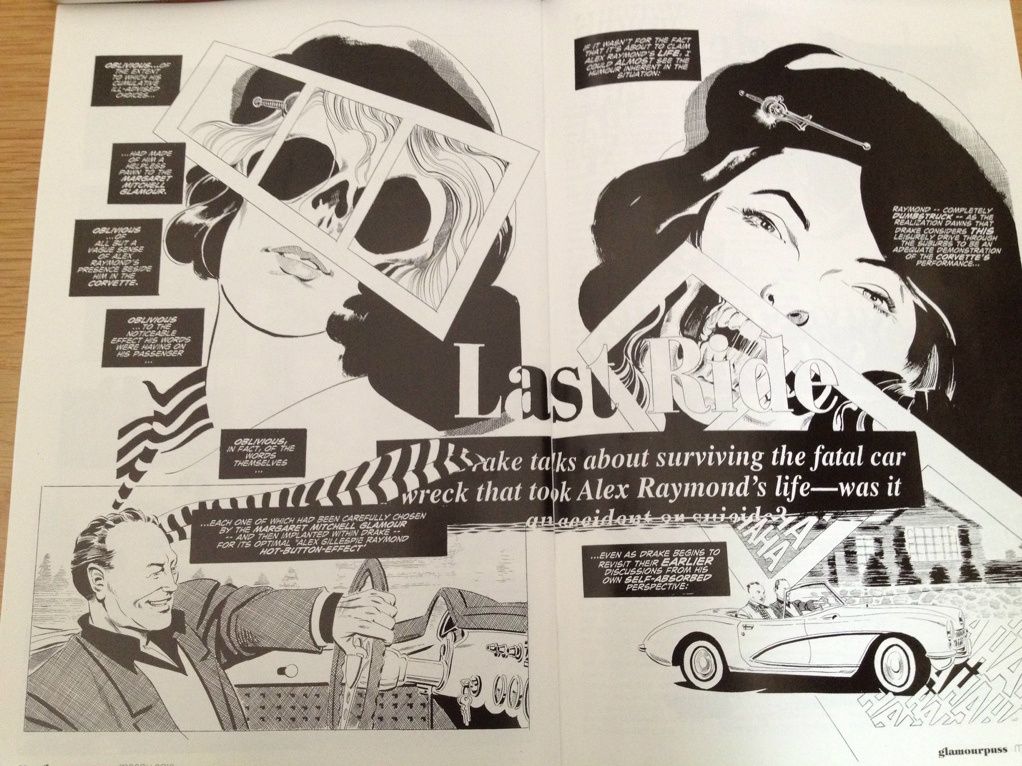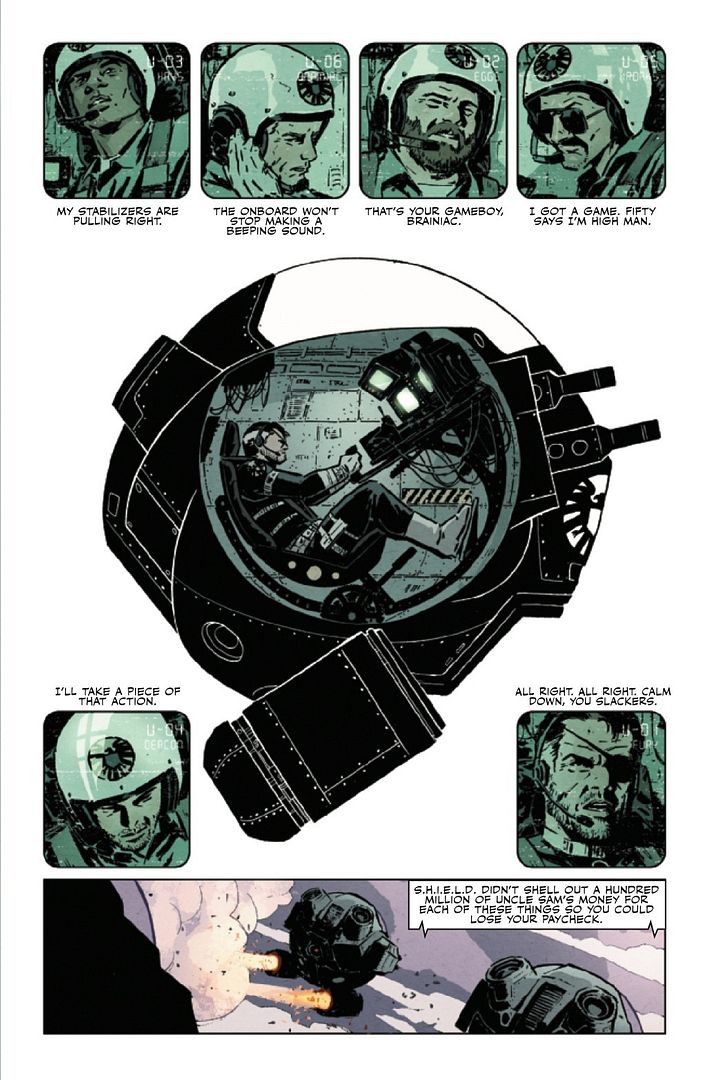Now that it's my turn on the wheel of "blog until you drop" here at SC, I probably can't get away with the whole "somebody someday should write an essay about so and so" that I just dump in the lines of one of the 3700 reviews we do every week--there's really no reason I can't take the time to actually take one of those ideas and expand upon it. So rather than getting Part II of my review of last week's books (and I'm starting to worry there may be a very paltry Part II if it ever does show since my memory of last week's books has faded radically), I thought I'd try something different and look at PHONOGRAM #5 through the reflecting prism of CASANOVA #7, and vice-versa.
Casanova #7 came out a few weeks ago, the last issue in the first miniseries by Matt Fraction & Gabriel Bá about a reality-hopping super-spy dealing with hilariously complex family issues, and as I recall I left a placeholder in a blog entry in the hopes I'd get around to reviewing it. Phonogram #5, which came out just last week, is the next to last issue in the miniseries by Kieron Gillen & Jamie McKelvie about a music-based magician battling to keep his self intact as a group of other music-based magicians create a perversion of the Britpop movement to which he's tied. Phonogram utilizes a fatter version of Casanova's Image Slimline format, where the writer fills the page count in back with essays about the work in front; whereas Warren Ellis (who came up with the format) invented the idea I think out of money-saving necessity, Gillen piles on all the material on top of a full twenty-two pages of story & art.
Many of my earlier complaints about Casanova centered around these back page essays from Fraction; although very enjoyable reads, these essays threatened to overwhelm and overwrite the reader's impression of the issue he'd just read. By contrast, Gillen's essays have moved from explaining references the reader might not understand to explaining plot points the reader might have missed to, ultimately, being the point of the whole exercise--Phonogram's densely coded emotional autobiography, although terrifically illustrated by McKelvie, is far more obtuse and has far less drama to it than reading Gillen write about Britpop like a man possessed, alluding at several points about a very personal emotional event from which his ideas for Phonogram--and the bitter, arch protagonist at its center--sprang.
Now, here's where I reach the branching fork in my essay and tell you a little bit about the road I'm not going to go down. On that road, I talk about DVD commentaries, opening weekend box office numbers, Newsarama and these essays. I talk about how, for better or for worse, consumers of story-driven art today consume it in a very multivalent way, as both traditional spectators and informed contemporaries; and thus there are two fantasy experiences the audience goes through simultaneously, the fantasy experience of identifying with the protagonist and experiencing the story, and the fantasy experience of identifying with the creator of the story and experiencing the story's creation. And down this road somewhere I probably suggest that whether it's a good thing or a bad thing, it's something that isn't going back in the box anytime soon, but that eventually a more complex form of criticism is going to have to emerge, one which is going to be able to ascertain the extent to which a work succeeds or fails based on the dimension in which it's working. Because the DVD commentaries and the essays presented in both Casanova and Phonogram (among all sorts of other ways in which professionals interact with fans) are already working on how the fans receive the work, and is also in some weird way part of the work itself, but is either being excluded from the criticism of the work or else included with the criticism of the work incorrectly, leading to a lot of muss and fuss and bother and frustration on the part of everyone involved.
But that's not what I'm here to talk about, unfortunately, although I needed to say all that as justification for the stuff I am going to talk about, so you know where I'm coming from and hopefully can understand why, hopefully, what I'm going to say about the essay pages in both Casanova #7 and Phonogram #5 is worth talking about, and relates to more than just the essay pages of both works.
In the text pages of Casanova #7, Fraction talks quite movingly about his wife's pregnancy and miscarriage, and the ways in which both affected the work he did in Casanova and the way he perceived the work he did in Casanova.
For example, Fraction writes about suddenly quitting his regular job with the company he helped start:
Just like that, the whole I love my job theme that Cass fought throughover these seven issues took on a new context. I saw for the first time, what I really wrote about. Cass, me, the jobs and the identities we chose to identify ourselves with...I hadn't been writing about free-spirited Cass not wanting anybody to tell him what to do...I wrote about me. I dunno, maybe a shrink could nail that from 100 meters but it sure as shit blew my mind.
Interestingly, to my eyes, the first issue of Casanova reads to me like that, but the series comes to be overshadowed by a completely different set of themes. In fact, Casanova spends most of the arc (Fraction uses the term "album" so I'll probably use that from here on out) caught between the demands of his controlling father and his vast government organization, the evil scientist who similarly has Cass under his thumb, and Cass's own complex desires to save his family. In short, I'd say that it's not I love my job so much as here's the life of a freelancer: telling people what they want to hear while I try to figure out how to get what I need out of the situation and also provide for me and mine.
Similarly, although Gillen writes extensively about Britpop in his back pages, it's interesting to me that The Afghan Whigs pop up repeatedly. It would be interesting to me, of course, because I'm one of those guys who played Gentlemen over and over and over, listening to it with gradations of awe and dread and shame and relief. (As Gillen perfectly puts it: "If you listen to Dulli's lyrics, it's like crossing the event horizon into the black hole of the male psyche.") The Whigs were not Britpop, unless there's some weird definition of the term that allows a band from Cincinnati to be included. Rather, Gillen keeps including them because it's central to understanding the psyche of his intensely male protagonist--the re-awakening of the Goddess that the protagonist fears is symbolic of the not-quite misogyny at the core of the protagonist--but it's a topic he can barely bring himself to address in all those thousands of words about The Manic Street Preachers and Oasis and Blur and Pulp (although I'm also a huge fan of Pulp's This Is Hardcore and can see how they fit into the protagonist's psyche as well). It's not fair to put all this on Gillen as I haven't seen his last issue yet (and, to be honest, my eyes glazed over at some of his earlier text pieces) but, like Fraction in Casanova, I wonder if Phonogram is really about what Gillen thinks it's about. Phonogram reads like it's supposed to be a dense, allusion packed meditation on the way pop culture, for better or for worse, matters, but it actually reads like a comic written by someone who would rather talk about anything other than what they're really there to talk about. (And although I can't quite get a grip on what that is, it has something to do with that event horizon of the male psyche and its relationship to pop culture--something beyond the stuff we find in Nick Hornsby's High Fidelity, where the pop fanatic uses his obsessions to hide from both responsibility, his fear of responsibility and his fear of his fear of responsibility. Phonogram has something even darker at its core and I can't quite get a handle on it.)
In the Savage Critic way of things, I'd give Phonogram an OK and put Casanova #7 on the high end of Good. But in this ultra-extended "how-the-hell-does Jog-do-it?" essay, what's more important is why both books aren't Great, even though I think they (and their creators) have the potential to be. They're both starting out, these guys, and it's easy and probably preferable to attribute a lot of it to just them learning the ropes, pacing problems, newbie blues, and there's a very good chance we won't see those problems as much or again as their careers go along. But there is also the chance--and that chance makes it worth putting all those words down, I think--that they might get tangled in the nets of their own essays, interviews, websites and commentaries, and let all their proclamations blind them from what's really going on in their work, and prevent them from taking those things and refining them. Because I do think the shit you can't bring yourself to talk about is precisely the shit that's most interesting in your art (and it's in your art precisely because it's so important to you and yet you can't bring yourself to talk about it). It'll continue to come up, of course, but whether or not it may or may not become fully realized and ferociously utilized--and every piece in an artist's work has to become fully realized and ferociously utilized if the work is to make itself indelible--is another matter altogether, a matter for which any number of essay pages, commentaries of blog entries may not be able to compensate.
Whew! Okay, now that's off my chest, let's see if I can remember anything all about GHOST RIDER: TRAIL OF TEARS #2...
 Okay, super-super short here as I am in the process of, even now, packing and panicking like a full-fledged fool in preparation for the upcoming vacation to Portland. (And, yes, if it is not a waffle-filled one, I will be very, very pissed.)
Okay, super-super short here as I am in the process of, even now, packing and panicking like a full-fledged fool in preparation for the upcoming vacation to Portland. (And, yes, if it is not a waffle-filled one, I will be very, very pissed.)












